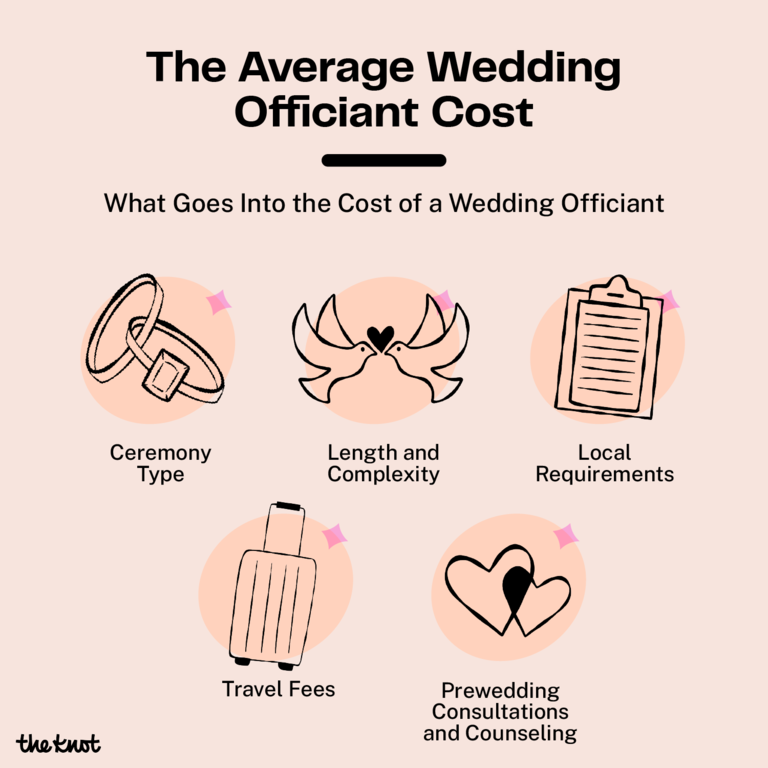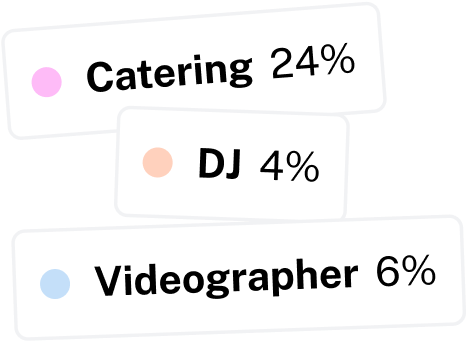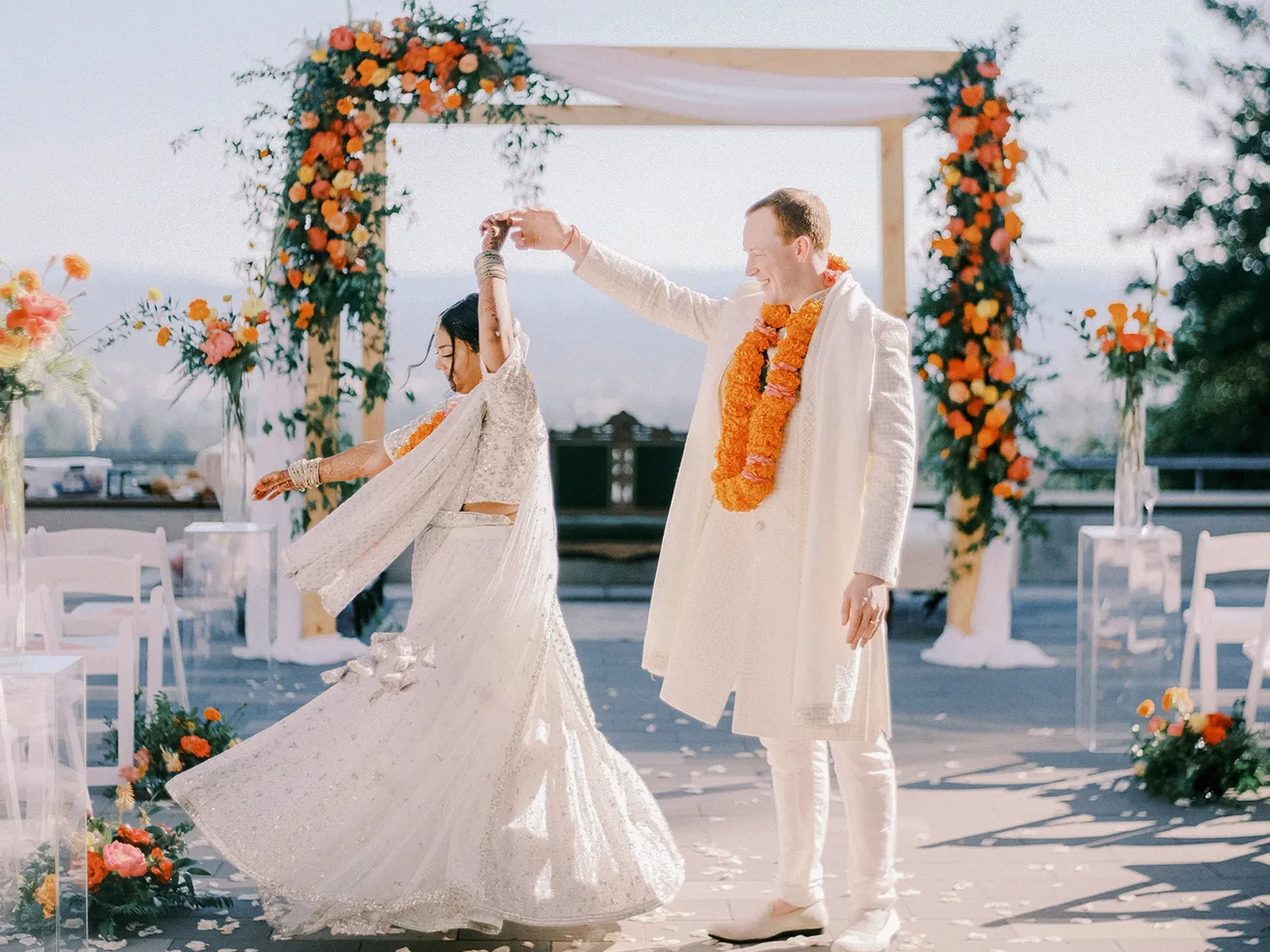A Guide to Wedding Officiant Cost, Fees and Donations

Whether you're being married by a religious officiant, a legal representative or a non-denominational celebrant, your wedding officiant cost is an important expense to keep in mind when considering the vendors you need for your special day. Since the wedding officiant is the person who makes your marriage actually official, they're kind of a big deal—but not all officiants are the same and their wedding officiant fee varies accordingly. But, how much is a wedding officiant? Don't worry! We at The Knot are sharing a rundown of how much a wedding officiant costs, along with the different factors that can impact the bottom line.
In this article:
- Average Wedding Officiant Cost
- Wedding Officiant Cost Factors
- How to Request a Quote From a Wedding Officiant
- Who Pays for the Wedding Officiant?
Average Wedding Officiant Cost
According to The Knot Real Weddings Study, which polled nearly 17,000 couples who were married in 2024, the average cost of hiring a wedding officiant in the U.S. is $240. This breaks down to just a little less than 1% of the average wedding budget, but it's important to note that the number isn't set in stone. Your final wedding officiant price will depend on your location, the type of officiant you're working with and your ceremony requirements. So, how much does a minister charge for a wedding? (Or a pastor or preacher?) What about a rabbi or imam—are their fees different?
Whether religious or secular, here's how much a wedding officiant cost can vary depending on the type of officiant.
Religious Wedding Officiant Fee
Instead of charging a wedding officiant fee, most houses of worship require or strongly encourage you to give money that covers expenses like building upkeep or ceremony attendants, such as an organist, altar server or cantor. How much you give could be entirely up to you, or your house of worship may have a suggested donation amount (usually a few hundred dollars). If you're not an existing member of the institution, then the donation amount may be higher.
"Religious officiants are often donation-based and tend to have more expenses if you are having them travel to your venue," says Sarah Glick, lead wedding planner at Brilliant Event Planning in Boston, Massachusetts. Because of this, Glick says that religious officiants can be more expensive than professional non-denominational officiants, but it all depends on your situation. Keep this in mind when choosing your ceremony location, particularly if you don't want to get married in a house of worship but still want to perform a religious ceremony—and be sure to ask about all fees and donations upfront.
Secular Wedding Officiant Fee
Secular officiants and celebrants are not associated with any religions or central institutions (i.e. city hall or county clerk office), which means they can perform a range of services, including elopements, interfaith, same-sex and symbolic ceremonies. Your officiant might be certified through a local or national organization, such as The American Humanist Association or Celebrant Foundation & Institute. Their services often vary, whether you simply need them to sign your marriage license or you're looking to create a fully custom ceremony. Depending on your needs, a secular wedding officiant's cost can range anywhere from a couple hundred dollars to $1,000 or more.
Civil Wedding Officiant Fee
Civil weddings usually take place at courthouses, city halls and other government-affiliated buildings. The ceremony is presided over by a legally appointed representative (like a judge, clerk or notary) rather than a religious officiant. You'll need to pay a fee for the marriage license, which usually varies between $30 and $100 depending on your state. On top of that, there may be a fee for the civil officiant to perform the actual ceremony, especially if they are traveling offsite. Lastly, some states encourage premarital counseling and will offer a discount toward your marriage license fee once the course is completed.
Friend and Family Wedding Officiant Fee
"The least expensive option is a friend or family member," says Glick. "You often only need to pay to make them a member of the Universal Life Church." It's crucial that your loved one gets ordained and is certified to perform weddings in the state where you're marrying—otherwise, the marriage won't be legal. So, how much do you pay an officiant friend? It's a nice gesture to cover the cost of their ministry classes or fees to register with the state, if any. This usually ranges anywhere from $10 to $100 depending on your location. And since officiating a wedding is a pretty important job, we also recommend setting aside some money for a gift to show your appreciation.
Wedding Officiant Cost Factors
No two wedding ceremonies are exactly the same, which means that your officiant will have to tailor certain details based on you and your partner. Here are the main things that could impact how much you pay for your wedding officiant.

Length and Complexity of the Ceremony
Similar to your other wedding vendors, the level of involvement and time required are two main factors when it comes to how much an officiant costs. "The number of ceremonies or rites the officiant needs to perform can impact the price," says Glick. "For example, for an Indian wedding, there are often pujas leading up to the wedding that involve the officiant. It's not uncommon to need the officiant for up to a week in this case, which would cost more than an officiant who is only performing the wedding ceremony."
Even if you're not having a multi-day wedding, the type of ceremony you choose will still impact the cost. A customized, 30-minute ceremony with multiple readings and personal anecdotes from your officiant requires more preparation on their part compared to a standard ceremony that's only a few minutes long.
Local Requirements
Depending on where you're getting married, local requirements can also affect wedding officiant pricing. In situations where premarital counseling is required (for example, some houses of worship), you may be able to complete the course directly with your wedding officiant for an additional cost. In the case of a destination wedding, you might also run into some unexpected costs when it comes to your ceremony or wedding officiant fees.
"In Mexico, you must have blood work done before you can be married legally, which has lab and hospital costs," says Bonnie Chase, CEO, owner and destination wedding planner of Events by Bliss in Cabo San Lucas, Mexico. "It's a good idea to talk about these details with your planner as early as possible to make sure that your requirements are met and that they are accounted for in your budget."
Travel Fees
Hiring someone who isn't local to where your wedding is taking place can be another hidden expense that impacts your cost of an officiant. "For example, if you are looking for an ultra-conservative Orthodox Jewish Rabbi or a Hindu pandit to officiate your wedding, you may have to fly someone in, which adds travel and accommodations to the budget," says Chase.
Some vendors will charge travel fees by the mile or the hour, while others will have a flat rate depending on the distance, so it's important to ask your officiant upfront how their pricing is determined.
Prewedding Consultations and Counseling
Performing your wedding ceremony is a highly personal task, which is why some officiants require prewedding consultations or multiple meet-and-greets before the big day. This gives them time to get to know you as a couple and understand your relationship, which will ultimately help them tailor the ceremony to you personally. The officiant may build the cost into your total payment or add it as an extra expense, but either way, you'll be expected to pay for their time.
How to Request a Quote From a Wedding Officiant
As you're researching wedding officiants, one critical detail to inquire about is how much the officiants charge. The great thing about browsing The Knot Vendor Marketplace for wedding officiants is that it makes the process of finding a pro in your region simple. Once you've got a short list of candidates, you'll want to go to the "Message Vendor" section to request a quote. Provide your event details including location, date, ceremony vision and whether you will have a rehearsal. Typically the wedding officiant cost will be quoted based on these variables:
- Initial consultations (per hour)
- Ceremony length
- Custom ceremony script and/or vows
- Marriage license signing
- Rehearsal ceremony (per hour)
- Travel fee
Price isn't the only factor to consider when booking a wedding officiant. You also want the best fit. A great way to determine that is to read their reviews on The Knot, talk to them about your event and ask the officiant these questions.
Pro tip: Instead of Googling "Wedding officiant cost near me," use our free budget tool to see what real couples in your region typically pay.
Who Pays for the Wedding Officiant?
According to The Knot Real Weddings Study, 33% of couples hire an officiant for their wedding day—but who actually pays for the wedding officiant fees? In a relationship where the couple identify as a bride and groom, the groom's family traditionally pays for the marriage license and officiant. But by today's standards, there are a lot of other factors that can influence who pays for what, so it's ultimately up to you and your partner.
"These antiquated 'who-pays-for-what' rules are long out the window," says Chase. "Weddings today typically have contributions from one or more families, as well as the couple themselves, but every situation is unique. A much easier way to manage wedding spending is for all contributions to be compiled into the master wedding budget, which is used to pay all of the expenses."
Either way, it's important to have a conversation about who's responsible for footing the bill when you're weighing the average cost for an officiant at a wedding. According to our data, the average couple in 2024 paid for 50% of their wedding, with parents pitching in to cover the remainder. Paying for most (or all) of your own wedding is more common than ever, but if a family member is contributing money toward your wedding officiant cost, they may expect to have a say in the final decision.
"Many couples tend to pay for their own officiant unless it's a religious or cultural officiant provided through their families," says Brooke Heflin, Founder and Director at Burlap and Bordeaux, a luxury design and event planning company in Southern California.
Aside from the wedding officiant fee, tipping your vendor is another detail to take into consideration. In general, the tip is a separate amount from the donation to your house of worship or the base marriage officiant cost. "As a service, if the couple feels their officiant excelled in their position, the couple may want to thank them with a gratuity if they feel that's how they'd like to express their gratitude," Heflin says.
One rule we can't stress enough is how important it is to have a contract with any pro you book, including your wedding officiant. They'll outline the final cost and payment due dates in writing, and you can decide how to cover the bill from there.
Additional reporting by Shyla Watson
The Knot Real Weddings Study captured responses from 16,956 US couples married between January 1 and December 31, 2024; respondents were recruited via email invitation from The Knot and/or WeddingWire membership. Respondents represent couples from all over the country with various ethnicities, income levels, race, age, sexual orientation and gender identity. To provide the most comprehensive view of 2024 trends, this report also includes wedding statistics from ad hoc studies conducted throughout the year. In a typical year, The Knot Worldwide conducts research with more than 300,000 couples, guests and wedding professionals globally.



























